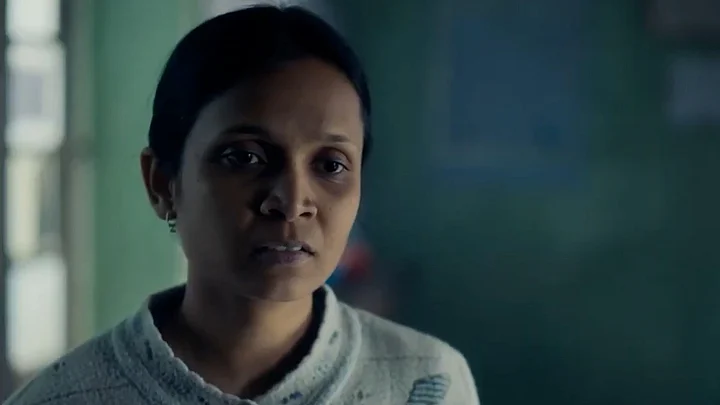A porcupine plays a major supporting role in Humans in the Loop, and a green leaf-eating worm makes a memorable appearance. Elephants and an egret are also featured. The protagonist, Nehma (Sonal Madhushankar), a tribal woman from Jharkand, describes moss as one of the reasons humans can breathe. She teaches her daughter, Dhaanu (Ridhima Singh), how to harvest wild sweet potatoes. Everything has life, we are told—including rocks—we just need to listen for its heartbeat.
It’s rather surprising that a film so reverent of the natural world—set literally on the outskirts of a forest—should be about … AI!
Written, directed and co-edited by Aranya Sahay (whose name even means ‘forest’!), Humans in the Loop pays tribute to the unsung human labour that powers artificial intelligence.
Taking inspiration from reporter Karishma Mehrotra’s essay ‘Human Touch’ (published in 2022 on FiftyTwo), the film is dedicated ‘to the indomitable spirit of the women of Jharkhand and the millions of data labellers quietly powering AI across the globe’.
Local Knowledge vs Artificial Intelligence
Nehma, in dire need of work, inveigles herself into a job at an AI data collection centre in rural Jharkhand. For AI to identify and later create precise images, it needs a giant labelled inventory of pre-existing images.
It comes down to Nehma and her colleagues to provide the correct labels—identifying, for instance, whether the rhizome in a photograph is adrak (ginger) or haldi (turmeric). It is Nehma who accurately identifies the object in the photograph as haldi because it doesn’t have the bulbs that adrak would.
Later, however, her innate intelligence—shaped by years spent in the forests of her childhood—lands her in trouble. When shown an image of the leaf-eating worm, she refrains from labelling it a ‘pest’ as instructed, because she knows it isn’t one: by eating only the rotted parts of leaves, it actually helps keep plants alive, instead of killing them like other pests.
But her manager, Alka (Gita Guha), tells her sharply not to use her brain so much, instructing her to simply put the labels the clients want to see.
And who are these clients? White Americans, of course—Americans who, on a Zoom call, reprimand Alka for the mistakes in labelling, pay no heed to her protests, and hang up with a threat that they may terminate her centre’s services if the labelling doesn’t improve.
These businesslike, ignorant foreigners may have no respect for indigenous knowledge—but this film certainly does.
Which is why Sahay spends so much time delicately evoking the sylvan surroundings in which Nehma and her two children live. The sensitive, tactile cinematography—filled with the texture of rock, the swaying of grass, the expressions on faces—is by Monika Tiwari and Harshit Saini, with additional work by Gunjan Jayawant.
Coupled with lush music from Saransh Sharma, it paints a robust picture of lives lived in communion with the natural world.
The Struggles of Daily Life
But Sahay is careful not to transform rural Jharkhand into an idyllic neverland. He pays tribute to his characters’ grounded knowledge systems, and to the struggles of their lives.
Nehma lives separately from her husband Ritesh (Vikas Gupta), with whom she had an inter-caste Dhuku marriage, a traditional practice where the couple live together in a relationship akin to matrimony, without the legal sanction of marriage.
But now their relationship has fractured and Nehma has moved out with both their children. To keep custody of them, she must have a regular job—hence the AI centre.
In a society steeped in stigma, Nehma’s daughter suffers for her mother’s choices. Ridhima Singh’s performance as Dhaanu is very true to a twelve-year-old’s rebellion against her mother’s life. She is branded the daughter of a dhukni (the term for a woman in a Dhuku marriage) and shunned for her illegitimate birth. She longs to live with her father in the big city, Ranchi.
Combating the daily strife of single motherhood, Nehma puts on a brave face and goes to work every day.
Sonal Madhushankar’s portrayal of Nehma is the film’s biggest success: she creates a woman wound tightly—a veritable knot of strength, reserve and anger.
She has affection for her children, but she is not effusive: indeed, she is far more expressive in rage than in love. Yet she displays unbridled joy when her baby son learns to walk—and see how easily that joy papers over an argument with Dhaanu. Madhushankar embodies this woman perfectly.
With the backing of Kiran Rao, Humans in the Loop releases on 5 September in Mumbai, and opens next week in Delhi, Kolkata, Bengaluru, Trivandrum, Chennai and Jaipur.
It’s a small wonder that an independent, small-scale feature such as this, stretching barely to 75 minutes, should see a theatrical run at all—but that the film itself should be so true and beautiful makes it more special.
(Sahir Avik D'souza is a writer based in Mumbai. His work has been published by Film Companion, TimeOut, The Indian Express and EPW. He is an editorial assistant at Marg magazine.)
